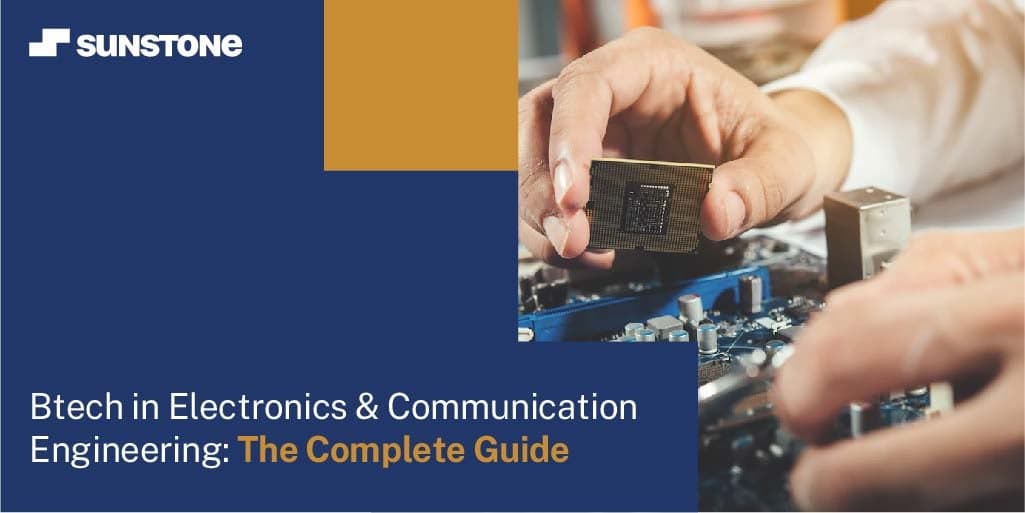5800 students unlocked their dream jobs with UG/PG programs in top colleges. Apply Now!
BTech in Electronics and Communication Engineering is one of the top courses that students can pursue after completing their 12th standard. The course is divided into 4 years, with two semesters per year.
The BTech degree focuses on some of the most critical areas of engineering, including electronics, electricity, and telecommunications. It also promotes the development of knowledge and skills required in order to combine software and hardware components. The main subjects that students need to pursue a BTech degree are Mathematics and Chemistry.
The BTech Electronics and Communications Engineering (ECE) degree involves the study of designing, applying, and analysing communication and electronic circuits. If you are interested in pursuing a BTech ECE course after 10+2, this article has all the information regarding the BTech in electronics and communication syllabus, overview and more.
Overview - BTech Degree in Electronics and Communication Engineering
The highlights of the BTech ECE degree are listed below.
|
Level of the BTech Course |
Undergraduate |
|
Course duration |
4 years (8 semesters) |
|
Type of Examination |
Semesters |
|
Process of Admission |
Entrance-based and merit-based |
|
Fee for the course |
₹2,00,000-₹1,00,000 (approx.) |
|
Average Salary(fresher) |
₹5,00,000-₹7,00,000 (approx.) |
|
Type of Job Profiles |
Application Developer Network Engineer CAD Engineer |
|
Top Recruiters in India |
Capgemini, TCS, Infosys, HCL, Wipro |
Course Highlights for BTech Degree in Electronics and Communication Engineering
The highlights of a BTech degree in Electronics and Communications are listed below.
- The study focuses on designs and concepts related to the hardware systems which come into use in areas like energy, telecommunications, and electronics.
- It focuses on developing, designing, testing, and researching electronics in plenty of systems.
- The course study of this BTech degree includes various core subjects along with elective subjects to gain in-depth knowledge.
- The delivery of the course is an integrated study approach that involves guest lectures, practicals, workshops, laboratory classes, and research projects.
- The study intends to impart in-depth knowledge about the topics underlying the electronics and communications sectors.
Eligibility Criteria for BTech Degree in Electronics and Communication Engineering
For getting admission to the BTech ECE degree, here are the eligibility criteria:
- Pass 12th standard with at least 50% marks from a recognised board.
- Have Chemistry, Mathematics, and Physics as the main subjects in class 12th.
- Or if you have a diploma in ECE, you can get admission to BTech ECE.
Top Entrance Exams for BTech Degree in Electronics and Communication Engineering
To get admission to BTech ECE, you must appear for the JEE Main exam or any institutional level exams. JEE covers all the NITs, IITs, as well as any centre-funded technical institutions. Here are the top entrance exams for BTech ECE:
- JEE Main
- JEE Advanced
- VITEEE
- BITSAT
- SRMJEE
Other than these top entrance exams, some of the BTech colleges in Delhi and other private colleges take direct admissions for a BTech degree.
BTech in Electronics and Communication Syllabus
The BTech ECE course is divided into 4 years, and each year has two semesters. The semester-wise syllabus is as follows:
|
Semester I |
Semester II |
|
Applied Mathematics-I |
Applied Mathematics-II |
|
Electrical Technology |
Introduction to Programming |
|
Manufacturing Processes |
Electronic Devices |
|
Applied Physics-I |
Applied Physics-II |
|
Applied Chemistry |
Communication Skills |
|
Fundamentals of Computing |
Engineering Mechanics |
|
Semester III |
Semester IV |
|
Switching Theory and Logic Design |
Network Analysis and Synthesis |
|
Analog Electronics - I |
Analog Electronics – II |
|
Applied Mathematics – III |
Applied Mathematics – IV |
|
Data Structures |
Electromagnetic Field Theory |
|
Signals and Systems |
Communication Systems |
|
Electronic Instruments and Measurements |
Computer Organisation and Architecture |
|
Semester V |
Semester VI |
|
Microprocessors and Microcontrollers |
Digital Signal Processing |
|
Digital Communication |
Information Theory and Coding |
|
Communication Skills for Professionals |
Microwave Engineering |
|
Digital System Design |
Data Communication and Networks |
|
Industrial Management |
VLSI Design |
|
Control Systems |
Antenna and Wave Propagation |
|
Semester VII |
Semester VIII |
|
Wireless Communication |
Ad Hoc and Sensor Networks |
|
Embedded Systems |
Satellite Communication |
|
Electives |
Electives |
BTech in Electronics and Communication - Jobs
The remuneration in the field of Electronics and Communication has no uniformity. There are many jobs after BTech in electronics and communication that you can apply for.
The BTech degree in ECE is a growth-driven field, and graduates get many opportunities after graduation. Some of the top jobs after BTech in electronics and communication include:
- Verification engineer
- Electronic engineer
- CAD engineer
- Design engineer
- Application engineer
The top recruiters in India in the field are:
- CISCO
- Toshiba
- Oracle
- Phillips
- Tata
BTech ECE - Courses after Completion
There are many courses that you can do after you complete your BTech ECE degree. Some top courses students opt for include MTech ECE, MBA, and MTech in Communication Engineering.
You can choose one of these best courses after BTech in electronics and communication to enhance your skills and get a better remuneration package.
Conclusion
These are some of the top things that you must know if you are interested in studying BTech ECE.
There has been a debate between BTech and BSc, and you can choose the right course depending on your interests and understanding. BTech is more focused on the technical aspects of a subject, whereas BSc focuses more on the theory of the subject. Moreover, BTech is a 4-year course, whereas BSc is a 3-year course.
The average remuneration package of a BTech ECE graduate is somewhere between ₹5 lakhs to ₹7 lakhs, but it can be more depending on the skills and experience. Before you opt for a course, it is important to fully understand all the aspects so that there is no ambiguity in the future.
If you need industry-oriented training, certifications and integration, along with assistance with admissions and placement, you can rely on Sunstone. The Sunstone provides assistance with self-financed learning, industry-ready training, placement pledge, career-oriented internships, access to top-notch b.tech recruiters and job opportunities, and so much more!
Contact us today to set yourself on the right path towards holistic learning and a successful career.
Also Read
HELP
Take the first step towards your dream job.
ABOUT THE AUTHOR


